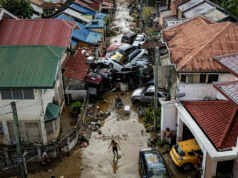
MOST FILIPINOS would likely vote for Senate candidates addressing issues of public healthcare funding, education and soaring costs of basic goods, according to the latest poll by public opinion research firm WR Numero Research.
In a February survey, 80% of Filipinos said they would vote for senatorial candidates backing the restoration of the Philippine Health Insurance Corp.’s (PhilHealth) subsidy, with only 7% saying otherwise.
More than two in three (67%) voters support candidates prioritizing solutions to the country’s education crisis, while 12% are opposed.
 Over half of Filipinos (54%) also said they would support candidates that would address inflation, it added. Almost 30% of Filipinos said they’re against them.
Over half of Filipinos (54%) also said they would support candidates that would address inflation, it added. Almost 30% of Filipinos said they’re against them.
“What I see is these are the ‘bread and butter’ or ‘rice and fish’ issues in the Philippines… the closest issues to the hearts of our countrymen,” Cleve V. Arguelles, chief executive officer and president of Philippine think-tank WR Numero Research, said in a press briefer on Thursday.
“These are the daily issues that may affect them,” he added.
The Philippines has long grappled with perennial issues of costly healthcare, worsening education quality, and rising prices — challenges that weigh heavily on a population already burdened by economic constraints.
Nearly one in two (48%) Filipinos said they would vote for candidates pushing for discussions on comprehensive sexual education, while a quarter said they’re against them.
Measures seeking to make sexuality education a mainstay in the school curriculum have faced backlash from conservative sectors of the predominantly catholic country. President Ferdinand R. Marcos, Jr. linked a Senate bill seeking to address teenage pregnancy through the “woke” mentality in January.
SOUTH CHINA SEA
Filipinos remain split on candidates endorsing cooperation with China to address South China Sea tensions, a pollster said, with around 40% of voters supporting such candidates, and 33% opposing them, while 27% remaining undecided.
Moreover, 35% of Filipinos expressed support for candidates advocating military modernization amid rising sea tensions. Nearly half (48%) opposed candidates perceived as steering the Philippines toward a war footing, while 24% remained undecided.
The Philippines and China have been at loggerheads over disputed features in the South China Sea, which Beijing claims almost in its entirety.
“What we see here is that there is no national consensus on how we should approach our problem, our challenge with China,” said Mr. Arguelles. “For an ordinary Filipino, it is a bit confusing because different policy and political elites have been offering different options for the public to consider.”
ANTI-DYNASTY
Filipinos are also divided on senatorial candidates supportive of anti-political dynasty bill, with 39% saying they are in support, 29% against, and 32% still unsure.
The split in public opinion could be due to the disenchantment of some voters to dynastic politicians, said Hansley A. Juliano, who teaches political science at the Ateneo de Manila University.
“Many of them are dependent on it, but they are beginning to think this can’t be sustainable especially when the dynasty in their hometown is only dominant because there is no strong opposition or they’re very incompetent,” he said in a Facebook chat.
Meanwhile, 33% of Filipinos said they would back candidates advocating for a divorce law. Around 40% of voters opposed them and 28% are undecided, according to the poll results. About half (49%) of Filipinos are also against candidates pushing for same-sex marriage, with only 26% willing to vote for one.
“Filipino families continue to remain conservative in their norms and beliefs,” Mr. Juliano said.
The nationwide, non-commissioned survey was conducted from Feb. 10-18, 2025, through face-to-face interviews with a nationally representative sample of 1,814 Filipinos aged 18 and older. The survey has a margin of error of ±2% at a 95% confidence level. — Kenneth Christiane L. Basilio



